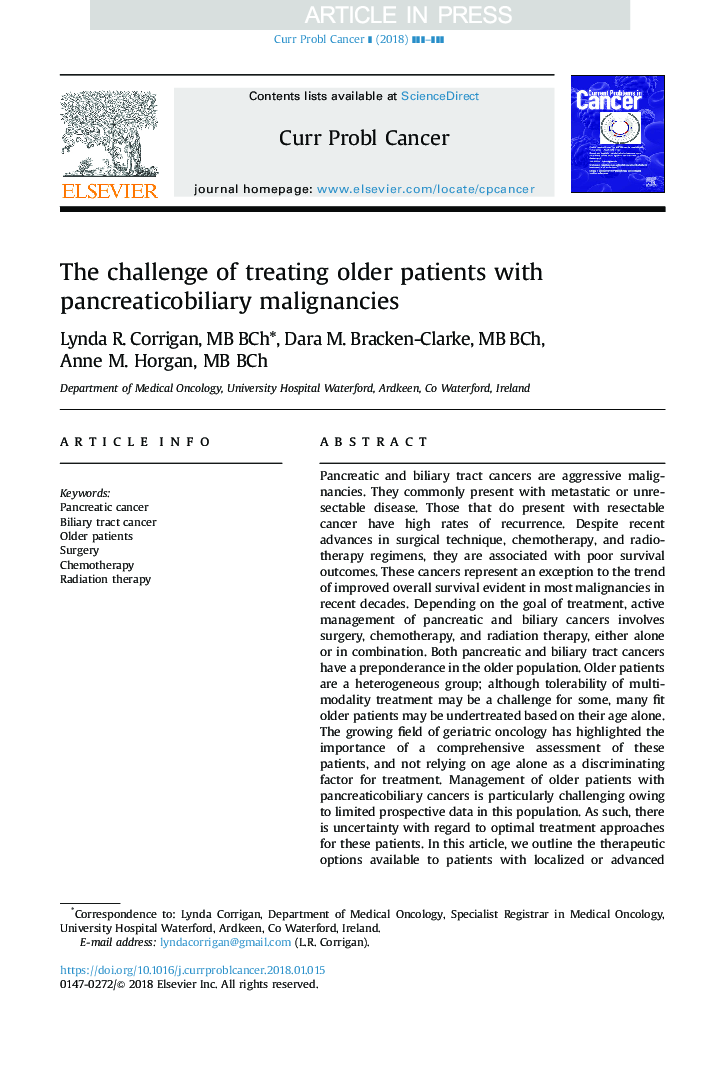| کد مقاله | کد نشریه | سال انتشار | مقاله انگلیسی | نسخه تمام متن |
|---|---|---|---|---|
| 8733860 | 1590735 | 2018 | 14 صفحه PDF | دانلود رایگان |
عنوان انگلیسی مقاله ISI
The challenge of treating older patients with pancreaticobiliary malignancies
ترجمه فارسی عنوان
چالش درمان بیماران مسن با بدخیمی های پانکراس سلولی
دانلود مقاله + سفارش ترجمه
دانلود مقاله ISI انگلیسی
رایگان برای ایرانیان
کلمات کلیدی
سرطان پانکراس، سرطان صفراوی، بیماران مسن تر عمل جراحی، شیمی درمانی، پرتو درمانی،
ترجمه چکیده
سرطان های دستگاه تناسلی و مجاری صفراوی سرطانی هستند. آنها معمولا با بیماری متاستاتیک یا غیر قابل رؤیت هستند. کسانی که در معرض سرطان قابل تنظیم هستند، میزان بالای عود را دارند. علیرغم پیشرفت های اخیر در روش های جراحی، شیمی درمانی و رژیم های پرتودرمانی، آنها با نتایج بقای بدنی ارتباط دارند. این سرطانها به استثنای روند بهبود بقای عمومی در بیشترین بدخیمی در دهههای اخیر نشان داده شده است. بسته به هدف درمان، مدیریت فعال سرطانهای پانکراس و صفراوی جراحی، شیمی درمانی و پرتودرمانی را به تنهایی یا به صورت ترکیبی شامل می شود. هر دو سرطان پانکراس و مجاری صفراوی در افراد مسن بیشتر پیش می آید. بیماران سالمند یک گروه ناهمگن هستند. گرچه تحمل پذیری درمان چندجمله ای ممکن است بعنوان یک چالش برای برخی باشد، اما بسیاری از افراد سالمند ممکن است به تنهایی تحت درمان قرار بگیرند. زمینه رو به رشد انکولوژی والدین اهمیت ارزیابی جامع از این بیماران را برجسته کرده است و نه به تکیه بر سن به تنهایی به عنوان عامل تبعیض آمیز برای درمان. مدیریت افراد مسن با سرطانهای پانکراس وابسته به انسولین با توجه به محدودیت های آینده موجود در این جمعیت، چالش برانگیز است. به این ترتیب، با توجه به روشهای بهینه درمان برای این بیماران، عدم اطمینان وجود دارد. در این مقاله، ما گزینه های درمانی موجود در بیماران مبتلا به سرطان های لوزالمعده و مجاری صفراوی محلی و پیشرفته و شواهدی برای گزینه های درمان مشخص در سالمندان را در نظر می گیریم. ما در بررسی و نتیجه گیری از بیماران مسن در مطالعات بالینی مربوطه بررسی می کنیم؛ بیماری هایی که ممکن است بیماران سالخورده با درمان های مشخص شده و ابزارهایی که ممکن است در انتخاب بیماران سالخورده برای درمان های خاص به پزشک کمک کنند، مواجه می شوند.
موضوعات مرتبط
علوم پزشکی و سلامت
پزشکی و دندانپزشکی
هماتولوژی
چکیده انگلیسی
Pancreatic and biliary tract cancers are aggressive malignancies. They commonly present with metastatic or unresectable disease. Those that do present with resectable cancer have high rates of recurrence. Despite recent advances in surgical technique, chemotherapy, and radiotherapy regimens, they are associated with poor survival outcomes. These cancers represent an exception to the trend of improved overall survival evident in most malignancies in recent decades. Depending on the goal of treatment, active management of pancreatic and biliary cancers involves surgery, chemotherapy, and radiation therapy, either alone or in combination. Both pancreatic and biliary tract cancers have a preponderance in the older population. Older patients are a heterogeneous group; although tolerability of multimodality treatment may be a challenge for some, many fit older patients may be undertreated based on their age alone. The growing field of geriatric oncology has highlighted the importance of a comprehensive assessment of these patients, and not relying on age alone as a discriminating factor for treatment. Management of older patients with pancreaticobiliary cancers is particularly challenging owing to limited prospective data in this population. As such, there is uncertainty with regard to optimal treatment approaches for these patients. In this article, we outline the therapeutic options available to patients with localized or advanced pancreatic and biliary tract cancers, and the evidence for specified treatment options in the elderly. We examine the inclusion and outcomes of elderly patients in relevant clinical trials; the morbidity that may be encountered by elderly patients receiving specified treatments and the tools that may assist the physician in selecting elderly patients for particular treatments.
ناشر
Database: Elsevier - ScienceDirect (ساینس دایرکت)
Journal: Current Problems in Cancer - Volume 42, Issue 1, JanuaryâFebruary 2018, Pages 59-72
Journal: Current Problems in Cancer - Volume 42, Issue 1, JanuaryâFebruary 2018, Pages 59-72
نویسندگان
Lynda R. Corrigan, Dara M. Bracken-Clarke, Anne M. Horgan,
